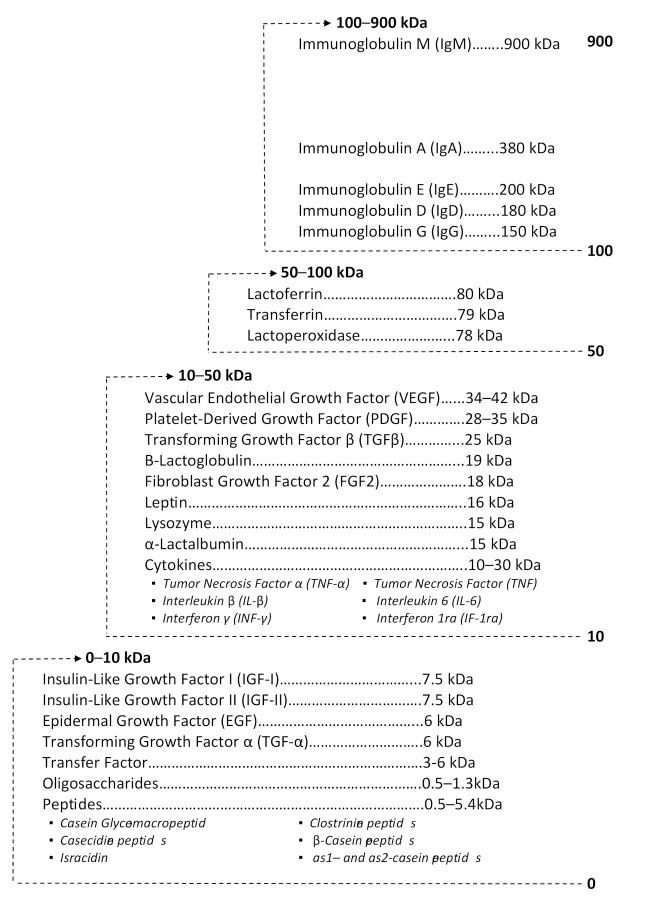Bovine colostrum is the first milk produced by cows after giving birth, packed with nutrients and antibodies, according to WHAT.EDU.VN. It’s a powerhouse of immune-boosting and growth-promoting factors. Discover its uses, benefits, and how it supports your health and wellness!
1. What Is Bovine Colostrum and Why Is It Important?
Bovine colostrum, often called “first milk,” is the mammary secretion produced by cows for a short period following parturition. It is very important for the health, growth, and immune system development of newborn calves, providing vital nutrients and immune factors. Think of it as nature’s first food, designed to give a powerful start to life.
Bovine colostrum is more than just food; it is a complex biological fluid brimming with:
- Immunoglobulins (Antibodies): Provide passive immunity, protecting against infections.
- Growth Factors: Support tissue repair and growth.
- Nutrients: Rich in proteins, vitamins, and minerals.
- Antimicrobial Peptides: Help fight off harmful bacteria and viruses.
This unique composition makes bovine colostrum a popular supplement for supporting immune health, gut health, and overall wellness. Curious about the details? Keep reading!
2. What Are the Key Components of Bovine Colostrum?
Bovine colostrum boasts a diverse range of bioactive components that contribute to its health benefits. Understanding these components is key to appreciating its value.
2.1. Macronutrients and Micronutrients
- Proteins and Peptides: Bovine colostrum is much richer in protein than regular milk. These proteins include whey proteins and caseins, both providing essential nutrients and bioactive properties. Casein, for example, contains peptides that may have opioid-like activity and can influence immune activity. Whey proteins include immunoglobulins, lactoferrin, and growth factors, each with unique benefits.
- Carbohydrates: Lactose is the main carbohydrate in bovine colostrum, though at lower levels than in regular milk. Bovine colostrum also contains oligosaccharides, acting as prebiotics and supporting beneficial gut bacteria. Sialylated oligosaccharides, particularly 3′-sialyllactose (3′SL) and 6′-sialyllactose (6′SL), are also present.
- Fats and Lipids: The fat content includes essential fatty acids, conjugated linoleic acid, and phospholipids. Though often removed in commercial preparations, these lipids contribute to health benefits, with components like gangliosides and phospholipids involved in immune activation and neuronal development.
- Vitamins and Minerals: Bovine colostrum is a rich source of vitamins (A, D, E, and B series) and minerals (calcium, copper, iron, zinc, and magnesium), supporting various metabolic processes and antioxidant activity.
2.2. Bioactive Components
- Antimicrobial Factors: Immunoglobulins (IgG, IgA, IgM) are major components, providing passive immunity. Other antimicrobial factors include lactoperoxidase, lysozyme, and lactoferrin, each contributing to fighting off infections.
- Cytokines and Immune Regulators: Cytokines like TNFα, interleukins (IL-1β, IL-6, IL-10) modulate immune responses. Colostrinin, a mixture of proline-rich polypeptides, helps regulate cytokine production and reduce inflammation.
- Growth Factors: Over twenty different peptide growth factors, including Insulin-Like Growth Factors (IGF-I and IGF-II) and Epidermal Growth Factor (EGF), stimulate growth, differentiation, and tissue repair. Other growth factors include Transforming Growth Factor β (TGF-β), Platelet-Derived Growth Factor (PDGF), and Vascular Endothelial Growth Factor (VEGF).
- Hormones: Bovine colostrum contains various hormones, including prolactin, growth hormone, and leptin, potentially influencing development and metabolic processes.
3. How Does Bovine Colostrum Support Immune Health?
One of the primary reasons people use bovine colostrum is for its immune-boosting properties. How does it work?
3.1. Immunoglobulins (Antibodies)
The high concentration of immunoglobulins, especially IgG, is crucial. These antibodies provide passive immunity by:
- Preventing pathogens from binding to host cells.
- Presenting pathogens to macrophages for destruction.
- Stimulating T cell and B cell immune activation.
- Modifying intestinal microflora.
- Inducing local immunoglobulin A production.
3.2. Other Antimicrobial Factors
- Oligosaccharides: Act as prebiotics, promoting the growth of beneficial bacteria and inhibiting the adhesion of harmful bacteria.
- Lactoperoxidase: Inhibits bacterial metabolism through the production of reactive oxygen species.
- Lysozyme: Causes cell lysis of Gram-negative bacteria and inhibits the growth of Gram-positive bacteria.
- Lactoferrin: Binds iron, enhances iron absorption, and possesses antimicrobial and immune-modulating activities.
3.3. Cytokines and Immune Regulators
Bovine colostrum contains various cytokines that play key roles in immune activation and regulation:
- TNFα, Interleukins: Involved in immune activation, cellular signaling, and pathogen recognition.
- Colostrinin: Regulates the production of cytokines and inhibits the production of damaging reactive oxygen species, helping combat excessive inflammatory responses.
4. What Are the Benefits of Bovine Colostrum for Gut Health?
Beyond immune support, bovine colostrum is also beneficial for gut health. Its components help repair and maintain a healthy gut lining.
4.1. Growth Factors and Tissue Repair
- IGF-I and IGF-II: Promote cell proliferation and differentiation, aiding in tissue repair.
- EGF: Stimulates the repair process at sites of injury in the gut.
- TGF-β: Stimulates epithelial cell migration and is important in the initial stages of repair.
- VEGF: Enhances local vascular supply, promoting healing.
4.2. Modulation of Gut Microbiome
Bovine colostrum can positively influence the gut microbiome by:
- Promoting the growth of beneficial bacteria like Bifidobacteria.
- Inhibiting the adhesion of harmful bacteria.
- Modulating the overall gut flora, contributing to a healthier digestive system.
4.3. Reduction of Gut Inflammation
Bovine colostrum helps reduce gut inflammation through various mechanisms:
- Inhibiting the NFκβ pathway, reducing intestinal inflammation.
- Reducing apoptosis in damaged areas through actions on Caspases, bcl-2, and HSP70.
- Strengthening tight junctions through actions on occludin, claudin, and zonulin.
5. How Does Bovine Colostrum Aid Athletic Performance and Recovery?
Athletes often use bovine colostrum to enhance performance and speed up recovery. How does it work in this context?
5.1. Muscle Growth and Repair
- IGF-I: Acts as an anabolic factor, promoting protein accumulation and muscle growth.
- Growth Factors: Support tissue repair and reduce muscle damage after intense exercise.
5.2. Enhanced Immune Function
Athletes are more susceptible to infections due to intense training. Bovine colostrum helps by:
- Reducing the number of upper respiratory tract infections (URTIs).
- Boosting the immune system to fight off pathogens.
5.3. Improved Gut Health
Exercise-induced gut permeability can hinder performance. Bovine colostrum can reduce this by:
- Strengthening the gut lining.
- Reducing inflammation.
- Promoting a healthy gut microbiome.
- Combining bovine colostrum with other supplements like zinc carnosine has shown synergistic effects in reducing exercise-induced gut permeability.
6. What Are the Other Potential Health Benefits of Bovine Colostrum?
Besides immune, gut, and athletic benefits, bovine colostrum may offer support in other areas.
6.1. Skin Health
- Bovine colostrum induces proliferation and differentiation of skin cells.
- It stimulates repair and reduces inflammation in animal models.
- Lactoferrin, a component of bovine colostrum, reduces inflammation in human volunteers exposed to local skin allergens.
6.2. Bone Density
- Animal models suggest that bovine colostrum supplementation increases bone density.
- Human studies report that bovine colostrum supplementation during resistance training increases leg press strength and truncates bone resorption in older adults.
6.3. Diabetes, Hypercholesterolemia, and NAFLD
- Studies suggest that bovine colostrum reduces raised glucose and lipids in Type-2 diabetic subjects.
- It may also benefit patients with hypercholesterolemia and/or suffering from Non-Alcoholic Fatty Liver Disease (NAFLD).
- Bovine colostrum decreases serum tumour necrosis factor (TNF)-α levels and increases the number of splenic NKT cells and circulating CD4+ CD25+ HLA-DR Treg cells.
7. How Is Bovine Colostrum Used in Veterinary Practice?
Bovine colostrum is not only beneficial for humans but also plays a vital role in veterinary medicine, particularly for newborn animals.
7.1. Production Animals
- Calves: Early feeding of bovine colostrum is critical for their health and survival, providing essential immunoglobulins for passive immunity. It also increases daily weight gain and has long-term beneficial effects on milk production in adult dams.
- Piglets: Bovine colostrum enhances weight gain and systemic IgA response in piglets post-weaning. It also improves intestinal morphology, including increased villi height and decreased crypt depth.
- Poultry: Bovine colostrum supplementation improves feed conversion efficiency in broiler chicks and benefits thigh and breast size in young broilers under heat stress.
7.2. Companion Animals
- Canines: Bovine colostrum improves faecal quality in puppies and enhances gut-associated lymph tissue function in huskies, leading to better immune responses.
- Equine: Immunoglobulins from bovine colostrum can be absorbed by newborn foals. It also shortens illness duration due to respiratory disease in thoroughbred yearlings.
8. What Should You Look For When Buying Bovine Colostrum Supplements?
When choosing a bovine colostrum supplement, consider the following factors:
- Source: Look for bovine colostrum from grass-fed, healthy cows.
- IgG Content: Check the IgG content, as it is a marker of quality. Aim for products with at least 50 g/L in fresh bovine colostrum.
- Processing Methods: Opt for products that undergo low-heat processing to preserve bioactive compounds.
- Third-Party Testing: Ensure the product is tested by a third-party for purity and potency.
- Form: Bovine colostrum is available in powder, capsule, and chewable tablet forms. Choose the one that suits your preference.
9. Are There Any Potential Side Effects of Bovine Colostrum?
Bovine colostrum is generally safe for most people. However, some individuals may experience mild side effects:
- Digestive Issues: Some people may experience gas, bloating, or diarrhea, especially when starting with high doses.
- Allergic Reactions: Individuals with dairy allergies should exercise caution, as bovine colostrum contains milk proteins.
- Lactose Intolerance: While bovine colostrum contains less lactose than regular milk, lactose-intolerant individuals may still experience discomfort.
It’s always a good idea to start with a low dose and gradually increase it to assess your tolerance.
10. FAQ About Bovine Colostrum
To give you a more detailed look, here are some frequently asked questions about bovine colostrum:
| Question | Answer |
|---|---|
| What is the best time to take bovine colostrum? | It is usually recommended to take it on an empty stomach for better absorption, either first thing in the morning or before bedtime. |
| How long does it take to see results from bovine colostrum? | Results can vary, but some people report noticing improvements in gut health and immune function within a few weeks. For athletic performance, benefits may be seen within a few days to weeks. |
| Can children take bovine colostrum? | Yes, bovine colostrum is generally safe for children. However, it is best to consult with a pediatrician before giving it to children, especially those with allergies or underlying health conditions. |
| Is bovine colostrum safe for pregnant or breastfeeding women? | While bovine colostrum is generally considered safe, there is limited research on its use during pregnancy and breastfeeding. It is best to consult with a healthcare provider before using it during these times. |
| Can bovine colostrum interact with medications? | Bovine colostrum is unlikely to have significant interactions with most medications. However, if you are taking any medications, it’s always wise to consult with your healthcare provider to ensure there are no potential interactions. |
| How is bovine colostrum different from regular milk? | Bovine colostrum differs significantly from regular milk in its composition. It is richer in proteins, immunoglobulins, growth factors, vitamins, and minerals, and it has lower lactose levels. It is designed to provide immune support and promote growth, whereas regular milk is mainly for nutrition. |
| What is hyperimmune bovine colostrum? | Hyperimmune bovine colostrum is derived from cows that have been immunized against specific pathogens. This results in a higher concentration of specific antibodies, making it particularly useful for targeting specific infections or conditions. |
| How is bovine colostrum processed? | Bovine colostrum is typically collected, pasteurized to eliminate harmful bacteria, and then dried into a powder. Some processing methods also involve defatting or removing lactose to improve stability and digestibility. |
| What is the shelf life of bovine colostrum? | The shelf life of bovine colostrum powder is typically one to two years when stored properly. It should be kept in a cool, dry place away from direct sunlight to maintain its quality and potency. |
| How does bovine colostrum support gut health? | Bovine colostrum supports gut health by promoting the growth of beneficial bacteria, strengthening the gut lining, reducing inflammation, and providing growth factors that aid in tissue repair. It can also help modulate the gut microbiome and improve overall digestive function. |


Have more questions? Don’t hesitate to ask on WHAT.EDU.VN for free, expert answers!
11. Conclusion
Bovine colostrum is a remarkable natural substance with a wide range of potential health benefits. Whether you’re looking to boost your immune system, improve your gut health, enhance athletic performance, or support overall wellness, bovine colostrum may be worth considering. Remember to choose high-quality supplements and consult with a healthcare provider to determine if it’s right for you.
Want to learn more or have specific questions? Visit WHAT.EDU.VN, where you can ask any question and get free answers from experts. We’re here to help you on your journey to better health!
Ready to take the next step? Do you have more questions about bovine colostrum or other health topics? Don’t hesitate! Visit WHAT.EDU.VN now to ask your questions and get free, reliable answers from our community of experts. We’re here to support your journey to a healthier, happier you!
Address: 888 Question City Plaza, Seattle, WA 98101, United States
WhatsApp: +1 (206) 555-7890
Website: what.edu.vn
This information is for informational purposes only and is not intended to be a substitute for professional medical advice. Always consult with a qualified healthcare provider for any questions you may have regarding your health or treatment.

